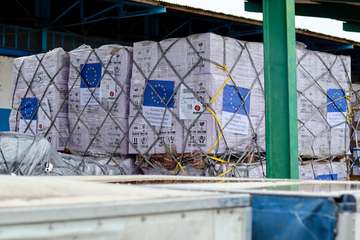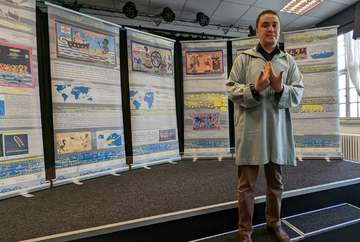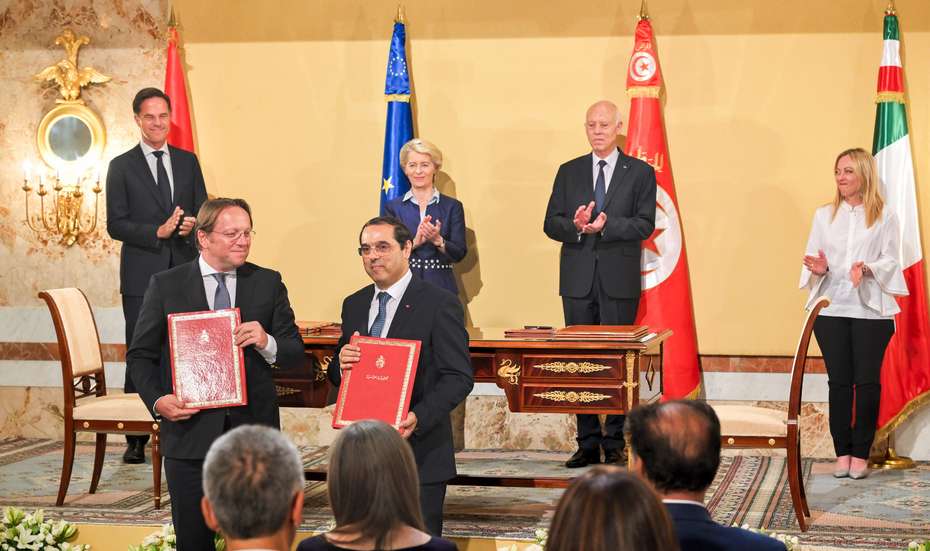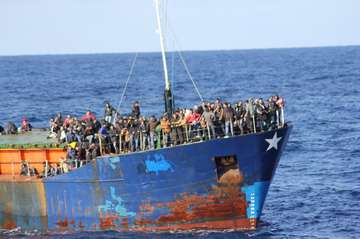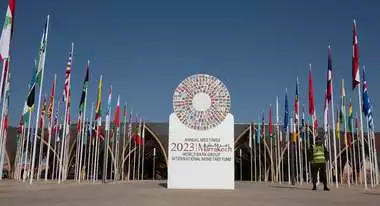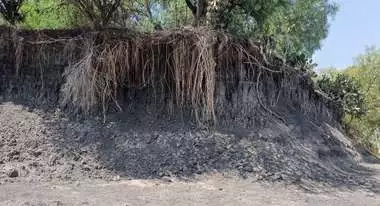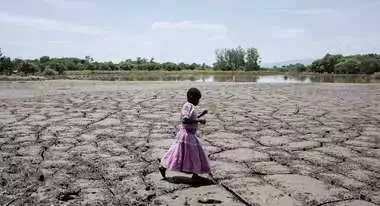„Some things are not negotiable“
Rainer Tetzlaff on regular and irregular migration from Africa and the challenges for German and European asylum and migration policy.
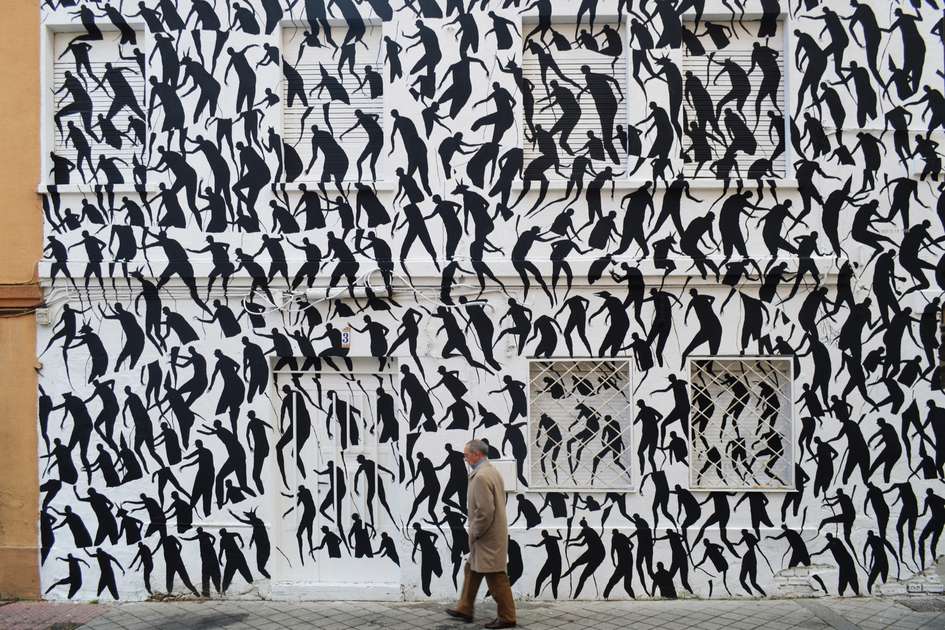
The number of migrants from Africa will continue to rise in Germany and Europe, but not to the extent that some right-wing populists predict. The extent to which flight and labor migration from Africa will increase depends on many factors, such as local economic development, the security situation, the consequences of climate change, how population growth is handled and, of course, the asylum and migration policies of potential host countries. Political scientist Rainer Tetzlaff suggests one should listen to what Africans have to say about the reasons for their flight and their arrival in Germany. If integration is to succeed, both migrants and the host society must adapt.
Mr. Tetzlaff, is there a Christmas market or a winter market in Hamburg?
In my district there is only a Christmas market. But I don't know if that's the case in every suburb or if certain areas with a high percentage of non-Christians and migrants might instead have winter markets out of respect for them. In any case, the central market at Hamburg City Hall in December is still called the Christmas Market, and to the delight of the children, there is still a Santa Claus with a long white beard, happily riding back and forth in his sleigh above the heads of the public.
The person
Prof. Dr. Rainer Tetzlaff taught Political Science and African Studies at universities in Berlin, Bremen, Eichstätt and, until his retirement, in Hamburg. His most recent book is "The African Gaze. Unexpected Perspectives on Integration." (Verlag Brandes & Apsel, Frankfurt 2023).
Talking about the migrant population, what is the proportion of refugees with African roots?
There are about 700’000 officially registered nationals of African countries living in Germany, 200’000 to 300’000 of them from the five Maghreb countries. Overall, this is less than one percent of the total population of our country and only a small minority of the approximately 25 million people with a migration background in this country. The number of Afro-Germans is estimated at one million. In addition, there are tens of thousands of unregistered minor children living all over Germany. Of course, there are not only refugees, but also students or highly sought-after trained migrants such as doctors, nursing staff, and employees in the catering industry. Among the top ten countries with the highest number of asylum applicants in 2022, there were only two African countries and they were at the bottom of the top ten, namely Eritrea and Somalia, each with around 4,000 asylum applications.
In his widely reviewed and best-selling book "To Europe," U.S. journalist and university lecturer Stephen Smith claims that population growth in Africa will trigger a wave of migration to Europe. In the next 30 years, he says, Africans will make up a quarter to a third of the population in Europe. Africa, Smith said, is "Europe's Mexico". Do you share that assessment?
No, I don't share that assessment in that form. It suggests that no political changes would take place. First of all, it should not be forgotten that strong population growth in many regions of Africa is only one cause of flight and migration – along with war, climate change, lack of prospects for young people, and poverty. And secondly, I think Stephen Smith's scenario is too alarmist in that it assumes that Europeans would not try to defend themselves against such a rush of irregular immigrants. But if were to look not only at erecting barriers, but ask: Where and how can talented but resource-poor people survive in ten, twenty, thirty years? Then such figures could well be realistic and force us to think more intensely and creatively about the future of European-African relations in order to avoid catastrophes as far as possible.
At present, migration – like other critical developments such as the climate crisis – triggers feelings of political impotence in Europe and elsewhere. We take note of conflicts that are still intensifying without being able to offer solutions based on consensus. The structural clash of interests between industrialized countries and African countries is obvious: One sides wants free access to markets, but at the same time tries to seal its borders against undesired economic migrants, while the other side wants to protect its trade and customs regime against superior foreign competition. At the same time it has no interest in preventing its young, dynamic youth, who are willing to work but have no prospects at home, from emigrating abroad and sending money back home. There is a right to migrate, but no right to immigrate to a particular country. This is a dilemma for all concerned that is very difficult to resolve.
Are there limits to what can reasonably be tolerated by immigrant societies, as Paul Collier claims?
Yes, I share this view, which incidentally Hannah Arendt formulated decades ago. Reinhard Merkel, a legal scholar and long-time member of the German Ethics Council, also pointed out that in order to maintain peace in a multicultural society, care should be taken not only to accommodate the claims of minorities, but also to regard the rights and customs of the majority population as worthy of protection. Of course, what is considered "worthy of protection" and valuable changes with time and circumstances and must be renegotiated again and again between majority and minorities.
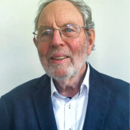
There is a right to migrate, but no right to immigrate to a particular country. This is a dilemma for all concerned that is very difficult to resolve.
Prof. Dr. Rainer Tetzlaff, Political scientist and Africa researcherYou have spoken with African migrants and read and quoted many texts by African scholars and authors. What in their opinion constitutes successful integration?
In short: finding work, earning money to buy what is necessary to survive and perhaps to send a bit home. The security a migrant has gained – protection from expulsion, elimination and starvation – is quickly taken for granted. Since 2015, however, the major political mistake in Germany has been to overlook the fact that people from Africa come here to build a new life by working independently. They are fed, they receive a roof over their heads, they receive a lot of touching help from churches and civil society. But for an extended period of time they are not allowed to earn a living. In the first months after their arrival, they are forced to wait, a grueling wait. But migration research has shown that integration also depends on how people feel they are treated, especially in the first few months after their arrival.
Refugees have told me that they want to contribute to this society, in return for the protection they receive. That corresponds to African ideas of solidarity and hospitality. But integration via the labor market is initially blocked by cumbersome, overly bureaucratic asylum and integration policies. Apart from the permission to work and suitable and sufficient access to language courses, refugees see a reliable perspective that they can remain in the country as major contributor to successful integration. If that is assured, the preparedness to accept onerous processes and to integrate into society increases – not for all, but for the majority. Thus, both sides benefit enormously from the integration of immigrants. After all, without well integrated immigrants, our society would hardly be able to function any longer. And finally, we should learn from societies that welcome immigrants such as Canada, Australia, Israel that immigrants themselves can and must also be expected to adapt.
We've talked a lot about what needs to change. Are there also things that should not change? Naika Foroutan, for example, an expert on integration in Berlin, outlines a post-migration Germany with a core of German-European identity that is worth protecting.
I agree with that. There are things that are not negotiable, such as the fundamental principle of a pluralistic, democratic society, including equality and equal rights for women and men. The constitution, human rights and well-tested laws apply to all, as does respect for the opinions of others. The privilege of religious freedom, which does not exist in many countries of origin, should not be abused here in contravention of German constitutional rules. We must cooperate to preserve these and a number of other central stipulations that have grown to define our identity. However, we should also pay attention to what is bearable for others and what is not. For example, refraining from burning the Koran is, in my view, one of the ways in which the majority in society can demonstrate its capacity for adaptation: to achieve this, we do not need to change the legal system, but out of respect for the feelings of others with a different social background we should voluntarily desist from applying the law in the interest of peaceful coexistence. Immigrants should also be given space.
So adaptation or assimilation is an important part of integration?
Yes. Values and rules of the host society are important, for instance, shaking hands with women. At the same time, cultural traditions should also be nurtured; newcomers don't have to adapt to everything. Points of friction need to be renegotiated over and over again, both sides need to move towards each other. However, assimilation should be rejected as a goal of integration, because it can be understood as the forced renunciation of traditional cultural values.
You write in your book that newcomers all bring along "cultural baggage", but that it differs from person to person. On the other hand, you also observe shared attitudes among refugees from African countries, such as a "ubiquitousness of cultural contrasts as part of African reality", as you put it. Does that facilitate integration or make it more difficult?
First of all: In my view, a person's identity is not simply a function of origin, such as language, family, landscape, culture, work, but can also be expanded or changed by new experiences in a foreign country and by cultural appropriation. But the cultural baggage that African immigrants bring along is, in my opinion, most often an obstacle, because in the country of immigration the migrants cannot put to use many of the strengths and experiences that they have acquired. For example, they have to learn to assert themselves as isolated individuals in our vibrant society, which initially is naturally perceived as foreign and intimidating, and the cultural baggage can be an obstacle to this. But in certain circumstances it can become important if it comprises values that provide comfort and moral orientation as a compass in life. The attitude towards women, towards authority, towards the state – all this often clashes with our societal values, African authors report. Everyone speaks of 'good reasons' for their flight, but successful integration requires tremendous efforts on both sides – as well as counseling personnel, a lot of money, a lot of patience, a lot of tolerance, and so on. For a long time, this was not taken seriously in Germany. Some things have to be removed from the cultural baggage, others have to be added. Mutual learning is required, we need to know more about each other's cultural backgrounds in order to at least better understand the prevailing dissonances.
If integration is understood primarily as participation in central areas of the host country’s social life, as having a place at the table – do African migrants occupy such a place?
No, often they do not yet have one, although it is important to differentiate. There are immigrants from Turkey, Vietnam, China, Poland, Hungary, Ghana, Ethiopia or Senegal who have lived here for years, are fully integrated and occupy important positions. The situation is different for those who immigrated from Africa after 2015: By mid-2023, less than 50% of them have been integrated into the labor market, and there are numerous difficulties. Thousands should be repatriated to their countries of origin, but “deportation” is turning out to be a huge problem in moral, legal and political terms. So far, EU governments have not found an adequate solution. Maybe recent initiatives and attempts within the EU to expand the possibilities for entering a European country legally and to inhibit the business model of people smugglers can defuse the situation to some extent.
And of course, granting a work permit speedily also helps with finding a seat at the table. It is absurd: There is a labor shortage across Germany. African refugees would like to work, but changing status from being an asylum seeker to an economic migrant is still being obstructed. This is insupportable both in human and in economic terms and causes frustration.
Frustration is often followed by belligerence. Do conflicts impede integration or are they, as the integration paradox suggests, an indication of a successful process of integration?
There is no simple answer. It depends on the nature of the disputes and how they are conducted. In general, one can say – and this is also the opinion of many Africans: conflict is necessary. But it’s goal should not be submission. A culture of dispute within a peaceful context that accepts compromise and seeks a balance of interests is certainly conducive to integration and sets an example for a post-migration society. At the village level, Africans are well acquainted with peaceful conflict resolution by means of discussion between the parties during which an amount of compensation is determined.
This year the World Bank has for the first time set migration as a central topic of its World Development Report. It concludes that across the world migration offers advantages to both countries of origin and destination.
Many examples confirm that. For instance, if you look at Polish workers in the Ruhr area or, later, Vietnamese boat people in Germany. But I think things are changing at the moment. Unrestricted and irregular migration within a brief period of time is not necessarily of benefit to host countries anymore. The willingness to accept immigrants in Germany has decreased significantly between 2016 and 2023, and the topic of migration is being instrumentalized in election campaigns and talk shows, leading to a rise in right-wing extremist and nationalist positions – not just in Germany. Many people see their status within society at risk, costs are high and integration is patchy, to put it kindly. And even towns that are anything but xenophobic are groaning under the financial burdens they face in housing and managing refugees. Perhaps German migration policy in the last ten years can be summed up like this: Germany had a welcoming culture, but not a sufficient culture of integration.
But all forecasts predict that more African refugees will arrive in this country. In any case, it is not the poorest of the poor who are coming; they cannot afford to flee to Europe. Improving skills, better nutrition and education lead to an improved economic situation and thus to more migration from African countries.
It is true: It is not the poorest and neediest people who come to Europe from Africa as refugees and economic migrants, nor the displaced and persecuted from Africa's 16 civil wars. Theoretically, millions would have a right to individual asylum, if only ... Instead, those that are better off prefer to come here if they cannot get ahead professionally at home. I am convinced that more people above all from Africa will continue coming here – even if many fail in their attempt to flee or to emigrate, and even though EU governments will in future introduce more extensive and tougher measures to ward off refugees. The push factors favoring migration are simply too strong. European policies to combat the causes of migration brought little relief. The main causes of migration from Africa have been and remain growing poverty and persecution in war and terror zones, poor governance, climate change, lack of jobs, lack of prospects even for well-educated youth, religious intolerance, discrimination against women in patriarchal family structures, and so on. Therefore, it would be an important project of humanitarian reform to facilitate legal immigration even for those who are not highly specialized professionals and to finance training programs in African countries suitable for European labor markets.
The last German government, especially the BMZ (Federal Ministry for Economic Cooperation and Development), tried to combat the root causes of migration from Africa. Without success. The current government has now set up migration centers, in Accra for example. They do not only offer advice to returnees, but also to those thinking about leaving the country. Can this help to reduce irregular migration from Africa?
It makes sense to launch such initiatives together with Africans and in accordance with their needs. They can make a small contribution towards giving African societies productive perspectives. But effectively combating the causes of migration goes well beyond the BMZ's competence. In my view, a reform of the EU's foreign trade policy would be more appropriate, with the goal of avoiding any measures on the European side that would undermine or block job and market opportunities for Africans: Africa First instead of Europe First! If African producers were given better opportunities to grow what they can to feed their own population and to export agricultural surpluses and fish quotas to EU countries, this could set in motion an economic dynamism which would have significant social impact. Migration pressure would be reduced. But whether this vision is realistic in view of the well-known agricultural protectionism within the EU – I have my doubts.
The interview was conducted by:

